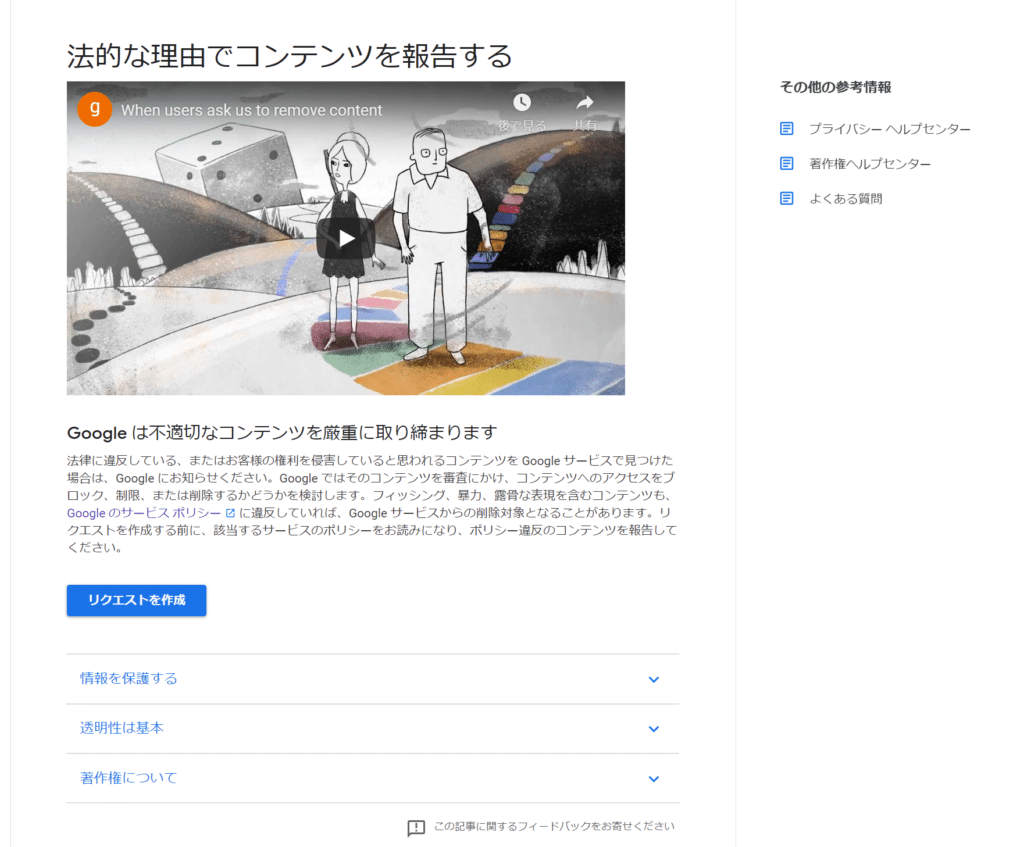How to Apply for the Removal of Google Search Results by URL

If a page that could be considered defamatory or damaging to one’s reputation exists on the web, it becomes difficult to apply for removal if the site operator is unknown.
In such cases, you would consider methods to prevent it from appearing in search engine results.
In this article, we will explain how to remove search results from Google, a major search engine.
How to Delete a Page

If you are suffering from reputational damage due to defamatory posts on bulletin boards like 5chan, the first step you should consider is deleting those posts. The deletion of posts or pages can be swiftly requested through a procedure called “provisional disposition” via the courts. For more information on provisional dispositions for defamation countermeasures, please refer to the article below.
https://monolith.law/reputation/provisional-disposition[ja]
However, when requesting the deletion of an article through the courts, the issue of international jurisdiction may arise. There are cases where Japanese courts cannot demand deletion from servers operated overseas. For more details on international jurisdiction, please refer to the following article.
https://monolith.law/reputation/against-facebook-amazon[ja]
How to Remove Content from Search Engines
There may be various circumstances where you cannot delete a page or article itself. In such cases, you would consider ways to eliminate access to that page. Since many articles on the internet are read via search engines, if the page disappears from the search engine’s results, there will be hardly anyone who can reach that article.
Therefore, you would request search engine operators like Google and Yahoo! to remove malicious pages or articles from their search results.
Procedure for Requesting Removal from Search Results
What methods are available to remove pages that could cause defamation or reputational damage from Google’s search results?
By accessing Google’s Legal Help, you can “report content for legal reasons.”

https://support.google.com/legal/answer/3110420?hl=ja&rd=2[ja]
By clicking the “Create a request” button and filling in the necessary fields, you can report the content you wish to remove.
However, even if you report the content you want to remove, it does not necessarily mean it will be removed. Also, according to the following disclaimer, the reporter’s name may be made public, so caution is required.
All legal notices received by Google are sent to the Lumen Project (lumendatabase.org[ja](English)) and may be published or annotated. Please note that while the sender’s contact information (phone number, email address, address, etc.) will be removed by Lumen, names, company names, organization names, etc. will be made public (reference image of published notice[ja]).
Also, the original notice may be sent to the alleged infringer or the rights holder if there is a reason to doubt the validity of the claim you have made.
Furthermore, similar information about the notice you sent may be published in Google’s transparency report.※Legal Help→Removing content from Google
https://support.google.com/legal/troubleshooter/1114905#ts=9814647%2C1115655%2C1282900%2C7163891[ja]
If you cannot get the search results removed by reporting in the above manner, you will consider taking legal action. Please note that Google is operated by Google LLC, a corporation in the United States. Therefore, lawsuits seeking the removal of Google’s search results require some documents and evidence to be translated into English and the registration of a U.S. corporation. As a result, compared to lawsuits where a Japanese corporation is the defendant, there are many cases where an additional 200,000 yen in actual expenses is added to the attorney’s fees. We will explain related court precedents from here, but as the procedure is complicated, we recommend consulting with a lawyer familiar with such procedures as soon as possible.
Court Cases Denying the Removal of Search Results
There are court cases that state, “In principle, it is not possible to request the removal of search results from search engines such as Google and Yahoo!”.
Case Involving Yahoo!
For example, the following judgment has been issued regarding a case involving the search engine Yahoo!.
“Even if a webpage containing illegal expressions is displayed as a search result of a search service, the operator of the search service is not the one making the illegal expressions, nor are they managing the webpage in question. Due to the nature of search services, operators are not in a position to judge the content or legality of the webpages displayed in search results. In modern society, removing a specific webpage containing illegal expressions from search results would significantly limit the opportunity for non-illegal expressions on the webpage to be disseminated or accessed by society. Therefore, a person whose personal rights have been violated by illegal expressions on a webpage can exceptionally request the operator of the search service to remove the webpage from the search results without requesting the person who made the expressions to remove them. However, this is only possible if the illegality of the webpage itself is clear, and the entire webpage, or at least a large part of it, is illegal. This is also only possible if the operator of the search service is able to recognize the illegality of the webpage upon receiving a request or similar, but neglects to do so.”
Tokyo District Court, February 18, 2010 (Heisei 22)
This judgment states that the cases in which a search engine can be requested to remove search results are limited to the following, considering the circumstances that “the operator of the search engine is not the one making the illegal expressions” and “the operator is not managing the page making the illegal expressions”, and the judgment that “a search engine is not in a position to judge the legality of a webpage in search results due to its system”.
- The illegality of the webpage appearing in the search results is clear
- The part that is illegal constitutes the entire webpage, or at least a large part of it
This judgment states that search results can only be requested to be removed if both of these conditions are met. In such cases, you can request the removal of search results in court by following these steps:
- Apply for the removal of search results by non-litigation means, and if the search engine is able to recognize the illegality of the page but does not remove it
- Request removal through the court
This means that you can request the removal of search results in court.
This judgment can be said to limit the cases in which the removal of search results is allowed to a very narrow range.
Court Cases Allowing the Removal of Search Results

On the other hand, there are court rulings that allow the removal of search results, which we will introduce below.
The debtor argued that the provider of the search service should not be obliged to remove search results, as the debtor does not make any representations about the accuracy or legitimacy of the search results due to the public interest of the internet search service provided by the site in question. Indeed, it is a well-known fact that the use of internet search services plays a crucial role in efficiently using the internet today. However, it is clear that the items listed in the main text of the first paragraph of the posted article are infringing on the creditor’s personality rights from the title and snippet itself. Even if the debtor is obliged to remove the posted article based on the description of each title and snippet of the posted article, it cannot be said that this would be unfairly disadvantageous to the debtor (in fact, according to the explanatory documents [A7, B5 to 7], it is recognized that the debtor has a system to remove articles that the debtor has judged to be illegal from the search results of the site in question). Moreover, it is hard to say that it is in the legitimate interest of those who use the site in question to be able to search for websites that contain descriptions that are clearly infringing on the personality rights of others. Therefore, the debtor’s above argument cannot be adopted.
Furthermore, the debtor argues that the debtor should not be obliged to remove search results as a rule, as it would be sufficient for the debtor to request the administrator of the website linked to the search results of the site in question to remove them. However, since it is recognized that the items listed in the main text of the first paragraph of the posted article directory are infringing on the creditor’s personality rights from the title and snippet of each posted article, it is natural that the debtor, who manages the site in question, has an obligation to remove them. Therefore, the debtor’s above argument cannot be adopted as long as it contradicts this.
Tokyo District Court Decision, October 9, Heisei 26 (2014)
As such, whether it is possible to request the removal of search results from a search engine through legal proceedings was a point of contention, with judgments at the district court level sometimes differing. As the Supreme Court had not made a judgment on this issue, a ruling by the Supreme Court was awaited.
Reasons Why Search Result Deletion Should Be Permitted
As a lawyer who has dealt extensively with reputational damage control, I believe that the deletion of search results should naturally be permitted. I will explain the reasons for this below.
Cases of Page Deletion
First, let’s consider the case of deleting not search results, but malicious pages. If a blog post is illegal and you request its deletion, not only the blog administrator who created and posted the blog post, but also the blog operating company and server operating company may become defendants in court. If someone suffers from defamation or reputational damage due to a malicious blog post, and cannot identify the person who wrote and posted the article, it is possible to request the blog operating company or server operating company to delete the relevant article.
The court recognizes that blog operators and server operating companies also have a “duty to delete on a rational basis”.
Blog operators and server operating companies did not write a blog post that could be considered defamation, but only posted an illegal article on the blog service or server they manage. Nevertheless, because the management operator has the authority to delete articles with illegality, they bear the “duty to delete on a rational basis” for illegal articles. For this reason, it is possible to request the deletion of blog articles from blog operating companies and server operating companies.
Deletion Obligation by Search Engines
Indeed, search engine operators like Google did not write and post illegal articles. However, they have a system in place to “delete articles judged to be illegal” from search results, and since they can delete articles with illegality, it is natural to think that “a duty to delete arises”.
I will detail below, but the current Supreme Court has made a judgment that in order to admit the deletion of search results, it is necessary that the necessity of deletion clearly outweighs the necessity of publication. Unlike the case of page deletion itself, it remains a question why the deletion of search results is not recognized unless “the necessity of deletion clearly outweighs the necessity of publication”.
Can Arrest Articles Displayed in Search Results be Removed?
In 2017 (Heisei 29), the Supreme Court of Japan addressed the issue of “whether it is legally possible to request the removal of search results from a search engine”. The Supreme Court concluded that if certain conditions are met, such as the necessity for removal clearly outweighing the necessity for publication, it is possible to request removal.
This case involved an individual who was arrested and fined in November 2011 (Heisei 23) for violating the pre-amendment Japanese Child Prostitution and Child Pornography Prohibition Law (Act on Punishment of Activities Relating to Child Prostitution and Child Pornography, and the Protection of Children). The individual requested Google to remove arrest articles and the like from search results. In the following, we will trace the flow from the provisional disposition to the judgment of the Supreme Court.
Removal of Search Results Approved in Provisional Disposition
The removal of search results from search engines can be achieved not through a formal trial, but through a procedure known as a ‘provisional disposition’. This case also began with a provisional disposition application to the Saitama District Court. The lawyer for the above-mentioned creditor (the person who applied for the removal of search results) argued that Google itself, by displaying arrest articles in search results, was infringing on privacy. In response, the Saitama District Court ruled that the display of arrest articles in Google search results constitutes a privacy violation, and thus approved the removal.
High Court Does Not Approve Removal of Search Results
In response to the decision of the Saitama District Court, Google filed a “Preservation Objection”. If a party is dissatisfied with the decision of a provisional disposition case, they can ask the court to reconsider by filing a “Preservation Objection” instead of an “appeal”. In this preservation appeal trial, it was judged that there is still public interest in the arrest case in question, and therefore, privacy infringement was not recognized. The High Court decision stated,
It is recognized that the arrest article in question is posted on what is known as an electronic bulletin board on the Internet, and it is presumed that a large number of facts and opinions unrelated to the crime in question are posted. Therefore, asking the original site administrator to delete individual posts, rather than deleting the webpage linked to the search results from the search results, or taking measures to hide it, can be evaluated as making public access to them virtually impossible in light of the fact that the appellant has a large share in the search service business and that it is extremely difficult to directly discover the URL of a site on the Internet, and it is recognized that this would result in infringing on the freedom of expression and the right to know of a large number of people who cannot be overlooked.
Tokyo High Court Decision, July 12, Heisei 28 (2016)
This means that unlike asking the operator of a bulletin board to delete a post, deleting search results would also negatively affect access to posts unrelated to the relevant article. Therefore, the disadvantage to the search engine is significant, and deletion should not be easily approved. This is the logic behind the decision.
The Supreme Court Approved the Deletion of Search Results
Following this decision, a procedure similar to an “appeal” was carried out, leading to a decision by the Supreme Court. The Supreme Court concluded that deletion is permissible when the necessity for deletion clearly outweighs the necessity for publication.
The lawyer for the appellant (similar to the “plaintiff”) argued against the indication in the aforementioned High Court decision, stating:
- If copyright infringement is found in part of a page, the entire page is clearly prohibited from being published under the Copyright Law.
- The Supreme Court has indicated in the so-called Northern Journal case that there is a right to request the suspension of article publication (right to injunction) in cases of personality rights infringement such as privacy infringement.
- This legal principle also applies in cases of privacy rights, etc.
These were the counterarguments made.
In response, the Supreme Court made the following judgment:
On the other hand, search service providers comprehensively collect information posted on websites on the Internet, save copies of it, organize the information by creating indexes based on the copies, and provide search results based on the indexes in response to certain conditions indicated by users. Although this collection, organization, and provision of information is automatically performed by a program, the program is created so that it can produce results in line with the search service provider’s policy on providing search results, so the provision of search results has an aspect of expression by the search service provider itself. Furthermore, the provision of search results by search service providers plays a significant role as the foundation of information circulation on the Internet in modern society, supporting the public in transmitting information on the Internet and obtaining necessary information from the vast amount of information on the Internet. Therefore, it can be said that if the provision of specific search results by a search service provider is deemed illegal and forced to be deleted, it is not only a restriction on consistent expression in line with the above policy, but also a restriction on the role played through the provision of search results.
Considering the nature of the provision of search results by search service providers, whether the act of providing URLs and other information of websites containing articles, etc. that include facts belonging to a person’s privacy as part of search results in response to a search request based on conditions related to a person is illegal or not should be judged by comparing and weighing various circumstances related to the nature and content of the facts, the range of transmission of facts belonging to the person’s privacy due to the provision of the URLs and other information, the degree of specific damage suffered by the person, the person’s social status and influence, the purpose and significance of the articles, etc., the social situation at the time of the publication of the articles, etc. and subsequent changes, the necessity of describing the facts in the articles, etc., the legal interest of not having the facts disclosed, and the reasons for providing the URLs and other information as search results. If it is clear that the legal interest of not having the facts disclosed is superior, it is reasonable to interpret that the search service provider can be asked to delete the URLs and other information from the search results.
Supreme Court decision, January 31, 2017 (Heisei 29)
This decision is a judgment that allows for the deletion from search results when the reason for deletion “clearly” outweighs the reason for being displayed as a search result. However, discussions are still ongoing regarding:
- Why it needs to be “clear”
- Whether deletion is not allowed in cases where it “somewhat outweighs”, i.e., it is not clear that it outweighs
These discussions are still ongoing.
Subsequently, in 2022 (Reiwa 4), a judgment was made that the requirement of “clearness” is not necessary for the deletion of Twitter tweets. This is explained in detail in this article.
https://monolith.law/reputation/twitter-r4-judgment[ja]
It is believed that practices will change according to future court precedents, so it is necessary to keep a close eye on them.
Summary
As mentioned above, the Supreme Court decision in 2017 (Heisei 29) has made a judgment on cases where the removal of search results from search engines like Google is permitted. However, this may change in the future.
The removal of search results is a complex procedure that requires advanced expertise. Therefore, it is advisable to consult with a lawyer who is familiar with these procedures as soon as possible.
Category: Internet





















